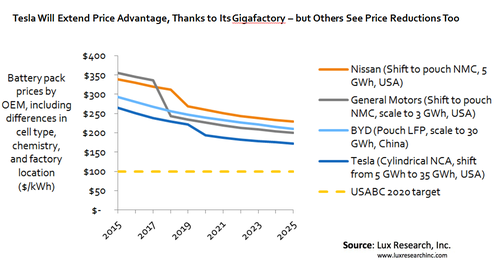Gigafactory Will Lead the Way as Battery Pack Prices Drop By 35%
Charles Murray, Senior Technical Editor, Electronics & Test
“Crossing the Line: Lithium-Ion Battery Cost Reduction and Its Effect on Vehicles and Stationary Storage,” contends that Panasonic-Tesla pack prices may drop as low $172/kWh, a reduction of about 35% from today’s costs.
A new study from Lux Research predicts that Panasonic-Tesla battery prices will hit $172/kWh by 2025, while Nissan’s NMC-based batteries will come in at $261/kWh.
(Source: Lux Research Inc.)
”Panasonic and Tesla are the leading supplier and leading user of lithium-ion car batteries,” Cosmin Laslau, author and research analyst at Lux Research Inc., told Design News. “Their capacity will give them additional power over the supply chain and more favorable pricing than other players might be able to extract.”
The study predicts that Tesla’s 18650-based NCA (lithium nickel cobalt aluminum oxide) will be the only battery pack chemistry to break the $200/kWh barrier. If the prediction turns out to be true, an 85-kWh battery for a Tesla electric car would cost just $14,620. By comparison, the Nissan-AESC NMC (lithium nickel manganese cobalt oxide) chemistry would come in at about $261/kWh, about 50% higher, the study says.
Laslau told us that Lux still expects a battery glut at that point, even with the cost reductions. Tesla’s well-known Gigafactory is expected to produce at least 35 GWh of battery capacity per year by then, which is more than five times the capacity of the entire global industry today. As a result, battery manufacturers will need to be prepared for price wars.
”The people who aren’t making cheap enough cells will the ones to be pushed into overcapacity,” he said. “They’ll have to make aggressive pricing cuts that will hurt their margins. It could be bad for a number of players.”
The big price reductions won’t bring the auto industry down to the longtime-USABC (United States Advanced Battery Consortium) goal of $100/kWh. "We don’t see it dropping to that level by 2025,” Laslau said. "After that, the industry will have to start looking at other chemistries beyond lithium-ion.”
Senior technical editor Chuck Murray has been writing about technology for 31 years. For Design News, he has covered electronics, automation, fluid power, and autos. He wrote his first article about electric cars in 1988.
- Forums
- Commodities
- Gigafactory will lead the way
Gigafactory Will Lead the Way as Battery Pack Prices Drop By 35%...
Featured News
Featured News
The Watchlist
FHE
FRONTIER ENERGY LIMITED
Adam Kiley, CEO
Adam Kiley
CEO
SPONSORED BY The Market Online










